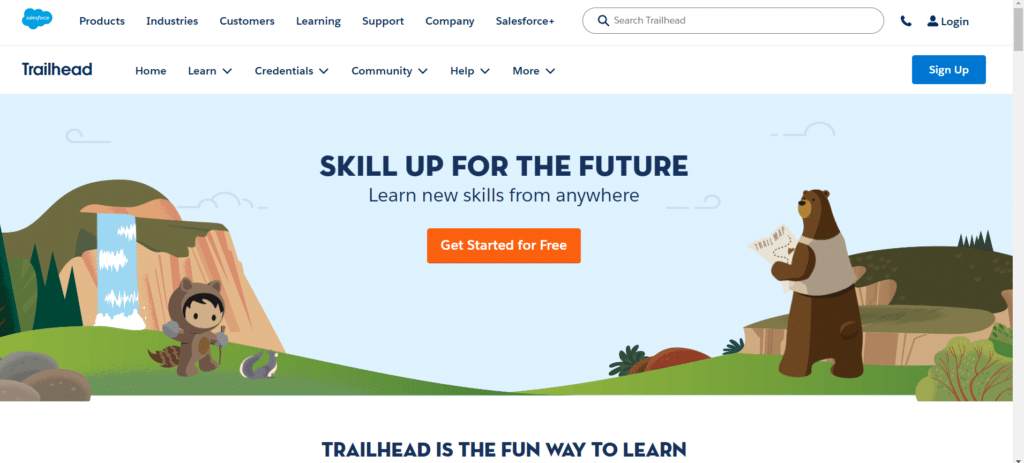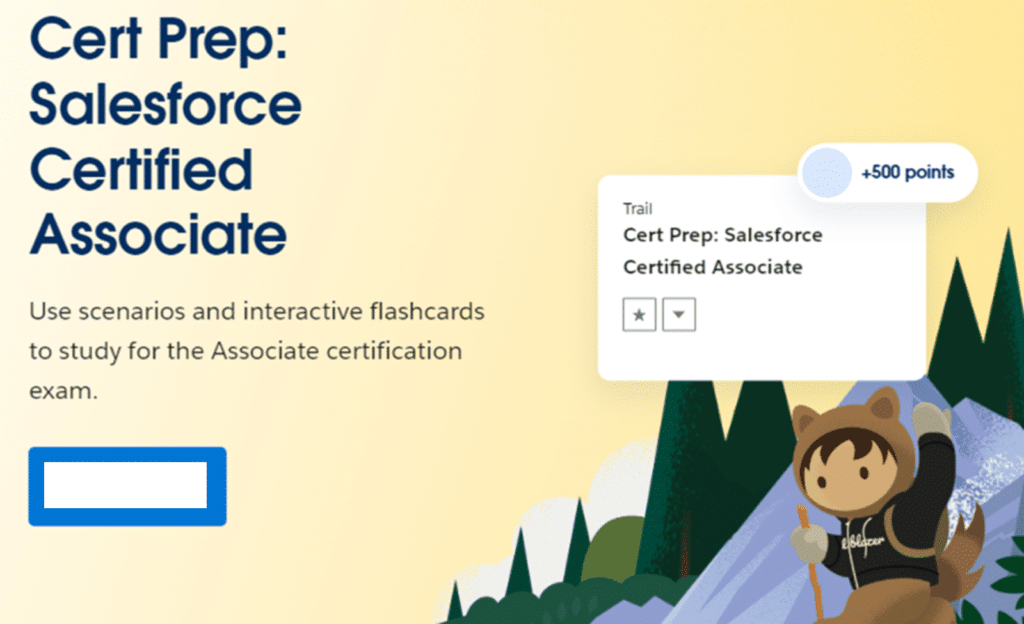Salesforce Associate Certification Exam: Testing your proficiency with Salesforce is an exciting and worthwhile undertaking. Gaining the Salesforce Associate Certification proves your expertise with the platform and can lead to new prospects in the ever-changing CRM industry.

We will work through the complexities of the Salesforce Associate Certification Exam in this extensive blogpost, offering advice, ideas, and techniques to help you pass the test and do well on it.
Table of Contents
ToggleWhat is the Salesforce Associate certification?
The Salesforce Associate certification is an entry-level certification for people with less than six months of Salesforce experience. It is the ideal place to start for Trailblazers committed to comprehending and utilizing the Salesforce Customer 360 Platform.

What defines a Salesforce Professional certification from a Salesforce Associate certification?
Salesforce Professional Certificates cater to those with broad experience, expertise, and abilities in a particular Salesforce function.

The Salesforce Associate assists Trailblazers in determining their desired career path in Salesforce and verifies their basic knowledge of the platform.
It also doesn’t need to be maintained because its primary purpose is to be a jumping-off place for Trailblazers to explore the Customer 360 Platform and learn about Salesforce’s professional certification options.
How Salesforce Certified Associate Certification Is Obtained
A Certified Salesforce Associate possesses a fundamental understanding of how an integrated CRM platform addresses the difficulty of tying departments and customer data together. They possess a basic understanding of data management, sharing, customization, user administration, and reporting. Technical know-how is optional.

The Salesforce Associate certification test assesses proficiency in the subsequent domains:
- How the CRM platform handles the problem of integrating client data with departments
- How Salesforce Client 360 can address business issues
- Essential phrases for the Salesforce Platform: requirements collecting, reporting, security, sharing, customisation, and data management are fundamental Salesforce capabilities.
The Significance of Salesforce Associate Certification Exam
Deciding which career path is best for you if you’re new to Salesforce could be challenging. The Salesforce Associate certification is an excellent way to start your credentialing journey and establish a foundation in Salesforce without committing to a specific career path. By studying for this exam, You’ll better understand how Salesforce functions and determine which job path most interests you.

Concerning the Salesforce Certified Associate Test

- There are 40 multiple-choice and multiple-select exam questions.
- The exam will take you 70 minutes to finish.
- 62% is the passing grade.
- The exam is $75 to take, and there is no fee to retake it.
- You have the option of taking the test in person or online.
- There are no requirements to take this test.
Who Would Be the Best Applicant?
Anyone wishing to advance their career in Salesforce with less than six months of experience can become a Salesforce Certified Associate. Salesforce claims that you don’t need any real-world technical skills. Yes, you can still get this certification without any prior experience! Although unnecessary, it’s the best preparation for the Salesforce Administrator Certification.
By validating fundamental Salesforce knowledge, such as what Salesforce is and does and how the platform addresses business needs, the Salesforce Associate Certification aims to equip Trailblazers for a career in Salesforce.
There are four topics on the exam:
- 32% of the Salesforce Ecosystem
- Navigation: 28%
- 25% of the data model
- Dashboards & Reports: 15%

Important Subjects
Salesforce Ecosystem: 32%: The exam’s most extensive and most heavily weighted section is this one. Your familiarity with the Salesforce ecosystem will be assessed on the following topics:
Resources to study and put Salesforce lessons into practice:
- Community Groups
- Community Developer Organizations
- Salesforce Assistance
The Salesforce product suite and the circumstances in which a specific product or cloud is needed:
- Use cases for CRM Analytics, Experience Cloud, Health Cloud, Sales Cloud, and NonProfit Cloud
- Salesforce usage by businesses, including what Customer 360 is
- The functions of CRM (customer relationship management) platform and the issues they resolve for businesses
- Multi-tenancy platforms and Salesforce architecture
- Career options and the duties of various positions, such as those of administrators, developers, and business analysts
Navigation: 28%: This scenario-based portion will assess your knowledge of where to look for licenses, organizational settings and company details, list views (including use cases for Kanban), search, and customization options (tabs, language, and time zone).
You should know where end users can make changes, including adding a phone number, changing their default locale, changing their password, or modifying their App navigation tabs, in addition to knowing where changes can be made on a more global scale.
You will be expected to be familiar with the AppExchange, managing users, and where basic customization in Setup happens, such as the Lighting App Builder.
Data Model: 25%: In this section, you will show that you understand the standard objects in Salesforce and how they relate. Accounts, Contacts, Leads, Opportunities, and Cases should all feel natural to you.
You must comprehend elements such as roles, role hierarchy, profiles, permission sets, record types, page layouts, and field visibility to recognize how visibility is regulated based on a situation.
Additionally, you should know how data integrity is maintained using mandatory fields, default values, and validation rules.
Dashboards & Reports: 15%: Get your hands dirty and become acquainted with reports, dashboards, and their features if you want to ace this part.
Reports:
- Report types include summary, joined, tabular, and matrix.
- When to use and build customized report formats
- Fields with buckets
- formatting that is conditional
- Formulas for reports
- Report restrictions, such as the number of records shown in a report
Dashboards:
- Parts
- Filters
- Subscriptions
Examine Your Approach
First, you want to review the official Salesforce Trailhead study guide. This gives you an excellent overview of every idea you should know before taking the test. You can use this as a revision plan by checking out the portions that you have fully grasped.
You should ensure that you test these features in a Trailhead playground, understand their limitations, attempt to break them, have fun with them, and study the principles on paper.
We advise you to finish Cert Prep: Salesforce Certified Associate and Prepare for Your Salesforce Certified Associate Credential on Trailhead to gain practical experience.
Exam Technique
Here are some recommendations we’ve compiled over the years to offer you the best chance of passing your exam with flying colors when the time comes.
First, print off a cheat sheet and attempt to recall any ideas you have trouble understanding before the exam so they are fresh in your mind.
Remember to read the question several times and pay close attention when taking the test. There will be abundant hints on the proper answer for the scenario-based questions.
Use the provided pen and paper to sketch out a data structure, role hierarchy, or any other design that will help you visualize the answer, if necessary if you are taking the exam in an exam center.
Make sure to apply the process of elimination when choosing an answer to eliminate any that are unquestionably wrong. Salesforce frequently includes responses that must be more accurate or comprised solely of features. Additionally, they enjoy mixing in features that seem correct but need to be better practiced, called curveballs. You can frequently work around these by concentrating on essential Salesforce features that complete a task.
Conclusion
This certification serves as a fantastic introduction to Salesforce and a means of proving that you have a thorough understanding of CRM platforms, the business requirements they meet, and the range of professional jobs that are accessible. It’s a fantastic first step in earning your Salesforce Certification Professional.
Salesforce claims this exam doesn’t require “technical expertise,” but I don’t think it’s simple. The questions and potential responses are crafted to intentionally confuse you in keeping with the standard Salesforce manner. The requirements require more technical know-how than you might anticipate and a firm grasp of the product suite.




